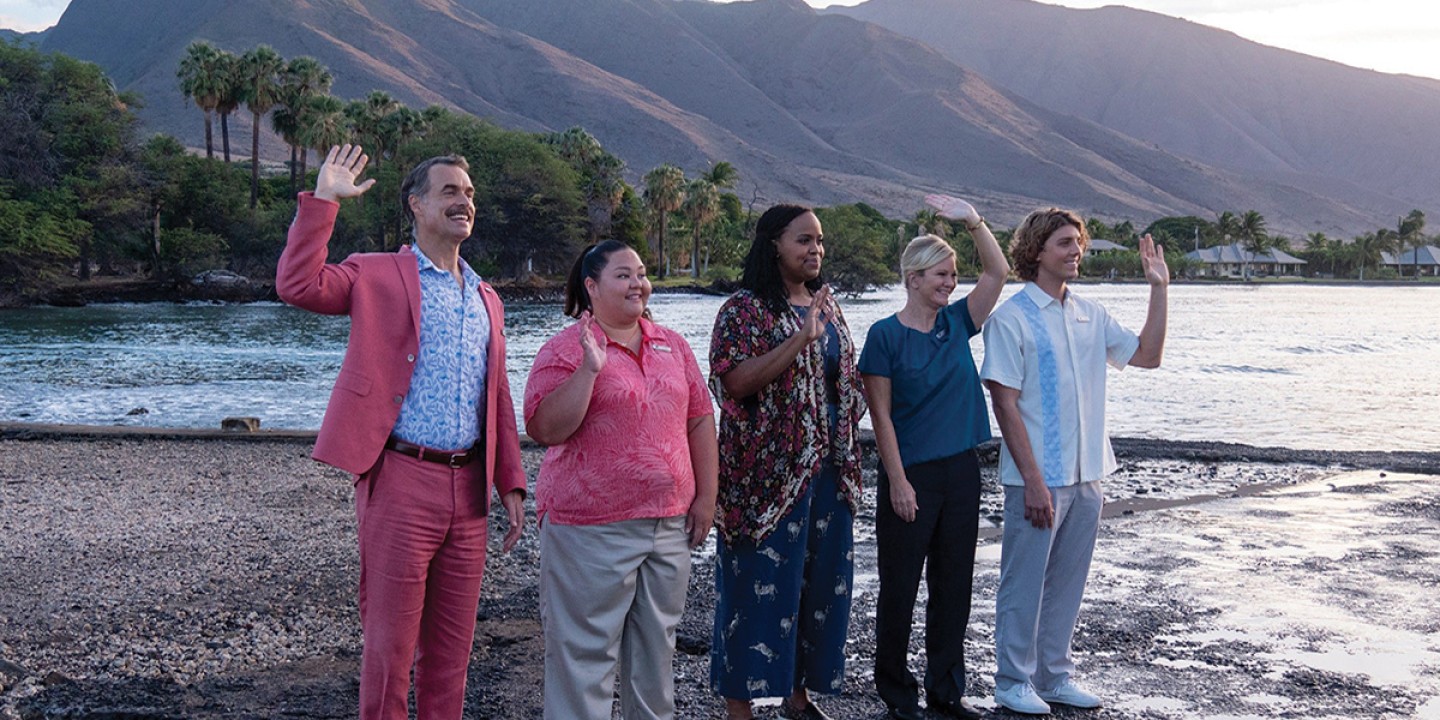The ultrarich and their total depravity
The White Lotus is part of a growing subgenre that probes extreme wealth as moral deformity.

“You have to treat these people like sensitive children,” Armond (Murray Bartlett) tells Lani (Jolene Purdy), the resort trainee, explaining her new job catering to the whims and emotional wounds of the ultrarich guests at the White Lotus resort in the first episode of the HBO drama by the same name. “It’s not even about the room,” he goes on. “They just need to feel seen. They want to be the only child, the special chosen baby child of the hotel.” Lani’s face blanches as she tries to hide the fact that she is listening to Armond while going into labor with an actual baby.
The fact that Lani’s birthing labor has to be hidden from the guests for fear of popping their narcissistic bubbles is the foundational metaphor for the whole series: the largely invisible labor of mostly brown-skinned employees that is required for the mostly lighter-skinned guests to enjoy their rest and relaxation. This is a recurring theme for the show’s creator Mike White (Beatriz at Dinner and Enlightened are favorite variations on the theme). By choosing a small, Hawaiian island, he can probe the longer colonial histories tangled up in this racialized division of labor: local dancers perform “an authentic indigenous dance” for the guests over dinner, the resort is built on land acquired unfairly from local residents, and it has so decimated the local economy that Lani feels grateful to work through her contractions.
Read our latest issue or browse back issues.
But these stories are intentionally kept on the margins. The center of attention is the ultrawealthy guests themselves, who arrive trapped in personal hells of unhappiness wrapped in the swaddling clothes of luxury.
There is Tanya (Jennifer Coolidge), a wealthy heiress who carries the ashes of her abusive, distant mother in an urn, and whose grief and insecurity are a hurricane force, sweeping up and spitting out the desires and hopes of anyone who crosses her path. There is the Mossbacher family, who are woke enough to feel slightly embarrassed by their wealth but not enough to give it up, and who are trapped in an impotent charade of family happiness. The biggest man-baby of them all is Shane (Jake Lacy), who ruins his own honeymoon in a petty vendetta against Armond when he thinks he’s been cheated out of the suite he deserves. Meanwhile his new wife, Rachel (Alexandra Daddario), slowly realizes the level of compromise and repression it will take to remain in her marriage. By the end of the first episode it is clear that not a single person at this resort could be called happy, and none of them knows how to be at ease.
The camera repeatedly pans out to show us the expansive ocean and mountain ranges that surround the hotel, a wild luxury of beauty. But the guests barely leave the manicured swimming pools or venture farther than a chaperoned boat tour. Confined in the hot box of the resort, the dramas of their lives build in concentric and intersecting stories toward a series of crescendos. These are small dramas—jealousy over a vacation flirtation, a double-booked room, a herniated disc, a ruined iPhone, a misplaced bag of recreational drugs—but they are fueled by a capacious inner pain that can find no other outlet and that sets in motion actions they cannot control. The effect is a cross between a tragic opera and a train wreck.
In most popular culture, wealth is presented either as a cautionary tale or as an aspirational norm. The point is to convince the non-wealthy viewer that we wouldn’t want all that wealth anyway because it obviously corrupts—or that if we got it we would somehow know how to use it for good and not succumb to its dark power. For either approach to work, we need to feel like the characters pay some sort of price for their wealth or at least learn from their suffering.
The White Lotus, however, insists on an even bleaker view of the corruptions of wealth. It is not that we aren’t supposed to take the pain of the rich seriously. Even Shane, the most blatantly spoiled and obnoxious of all the guests, can conjure some pity: his mother shows up during his honeymoon, a pitiful state of affairs if ever there was one. No, the point is that even the effects of that pain are outsourced to other bodies.
It is not enough for the Black and Brown staff of the White Lotus resort to clean up the guests’ literal and figurative messes, manufacturing distractions and pleasures that never, in fact, distract or satisfy. They exist also to absorb the guests’ petty jealousies, soothe their wounded egos, nurture their ill-formed dreams and aspirations, and take the fall for their misplaced bravado. The guests cannot be taught a lesson because their wealth protects them from the consequences of their moral deformity while continuing to uphold a system where they are the special baby children of the universe.
In this despairing vision The White Lotus reminds me most of Succession and Billions, two other prestige shows about the damage inflicted on the world by the wretched, wounded lives of the ultrarich. In this growing subgenre, there seems to be a new desire to probe extreme wealth as a state of total depravity. As with that Calvinist doctrine, there is a tendency to fatalism about the capacity of the humans involved to improve on their own. The only solution is radical conversion through unexpected grace, but the elect are few and far between.
The White Lotus ends with just such a moment: a character attempting to break from the corrupting cocoon of wealth by grabbing an improbable lifeline. I suppose it is a testament to how compelling I found the show that I didn’t believe for a moment that this conversion would last. But after six episodes, it was a necessary reminder that there are alternative visions of human life, in which purpose and power are not tied to wealth, even if it is harder for a camel to pass through the eye of a needle than for a rich man to find such a vision.






